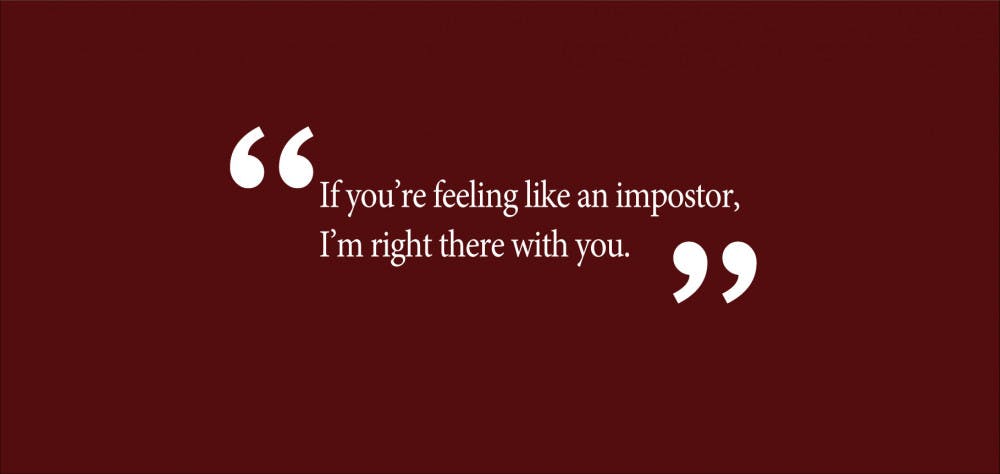The period of transition into college is different for everyone, but for most, Brown is an entirely new world. Many of us were among the most accomplished students in our high schools, and upon arriving at Brown, we realize that we are no longer as special as we thought. College is a completely different academic setting than high school. There are more options, more opportunities and, especially at Brown, way more freedom. Suddenly, it is up to us to manage our schedules and choose which clubs to join, to find new friends and plan out weekend activities. The new environment can be overwhelming, and with the prominence of social media, it can seem as though everybody has it figured out except for you.
For me, the pressures of settling in at Brown resulted in an internal pressure to live up to the social expectation of a Brown student. But I felt like a fraud on the inside. For the first couple of weeks, I lived in constant fear of being found out as undeserving, uncool or just unacceptable to this new community that I desperately wanted to join.
This condition is called impostor syndrome. A phenomenon that occurs in response to specific stimuli, impostor syndrome was first identified in a 1978 article that examined the feeling of being an impostor among high-achieving women. Doctors Pauline Clance and Suzanne Imes found that the participants in their study, despite receiving constant external validation, believed that others were overestimating their skills and intelligence — which led to a constant fear of being discovered as frauds. Clance and Imes believed that the phenomenon was at least partly attributable to gender stereotypes, as women in higher positions found themselves in increasingly unfamiliar and often hostile work environments. But impostor syndrome has since been proven to affect people of all genders.
The most important thing to know about impostor syndrome is that it is far from uncommon. Famous people who have addressed their experiences with impostor syndrome include Maya Angelou, Neil Armstrong, Michelle Obama, Tom Hanks and Brown University’s very own Emma Watson ’14. In fact, according to a review article in the International Journal of Behavioral Science, an estimated 70 percent of people will experience the impostor phenomenon at least once in their lives.
The same article presents evidence that impostor syndrome has a negative effect on students specifically. Students constantly compare themselves to their classmates and inevitably conclude that they do not measure up. They question how they got accepted into a selective program, and they perceive that their accomplishments are more due to good luck than hard work or personal attributes. This experience is especially salient at Brown. When the class of 2023 was selected with a minuscule 6.6 percent acceptance rate, it is all too easy for someone to look around and wonder what they did to deserve this opportunity.
Research reveals a multitude of factors connected to impostor syndrome, including familial expectations, overprotective parents, anxiety, depression, low self-esteem and perfectionism. In his article in the Journal of Multicultural Counseling and Development, Dr. Kevin Cokley and other researchers also found that high-achieving students of color are disproportionately affected by the impostor phenomenon. He also found that continued feelings of fraudulence result in more acute psychological distress. Impostor syndrome is common, and its effects are real.
There are many proposed techniques for dealing with the impostor phenomenon. In their 1978 article, Clance and Imes recommended group therapy sessions where people with impostor syndrome can see that they are not alone. They found that just knowing that other people felt the same way reduced feelings of impostorism. Researchers support other management techniques as well, such as emphasizing self-worth, using intrinsic rather than extrinsic motivation and psychotherapy. For new college students, research by the University of Vermont’s Dr. Queena Hoang in 2013 indicates that a mentor program allows for a smoother transition into higher education. There are many groups on Brown’s campus that provide mentors for first-year students, and in my experience, they help first-years feel more supported and give them a greater sense of belonging.
I don’t have an answer to the perennial first-year question of “How to Fit in at Brown.” How could I, when I am still very much a work in progress myself? But I’ll venture to offer just one piece of advice: don’t rush your process of settling in at Brown. If you feel uncomfortable or unsettled, you are far from alone. As poet Max Ehrmann wrote in his 1927 poem, “Desiderata,” “You are a child of the universe, no less than the trees and the stars; you have a right to be here. And whether or not it is clear to you, no doubt the universe is unfolding as it should.”
Bliss Han ’23 can be reached at bliss_han@brown.edu. Please send responses to this opinion to letters@browndailyherald.com and op-eds to opinions@browndailyherald.com.





